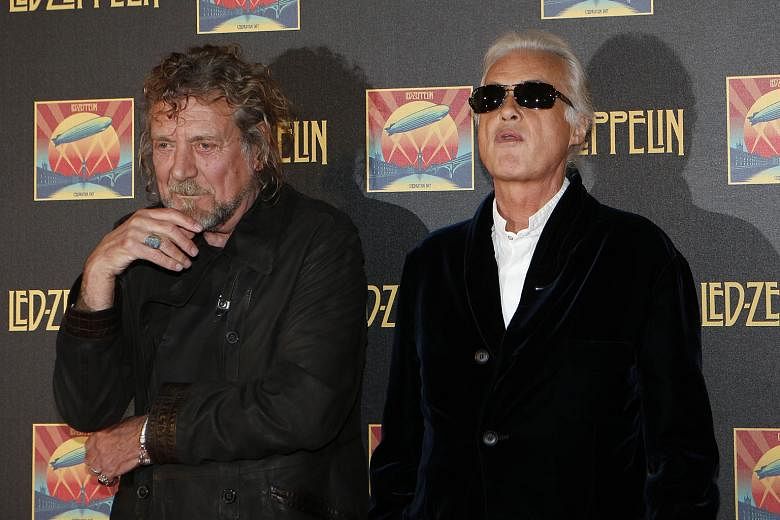LOS ANGELES• It is long, it is classic and, a jury decided on Thursday, it is an original. Led Zeppelin did not steal the opening riff of its rock anthem Stairway To Heaven, a federal jury ruled here, giving the band a victory in a copyright case in which millions of dollars were at stake.
The case pitted an obscure song from the margins of rock history against one of the canonical hits of the genre. The suit was filed two years ago by Michael Skidmore, a trustee for the songs of Randy Wolfe, a member of the band Spirit.
It contends that Led Zeppelin members Jimmy Page and Robert Plant had lifted substantial portions of the Spirit song Taurus, from 1968, for the beginning of Stairway To Heaven, which was released in 1971 and, by some estimates, has earned more than US$500 million (S$680 million).
Wolfe complained of the similarity in interviews but never brought a suit. He died in 1997. The case was filed shortly after a Supreme Court ruling allowed copyright infringement cases to go forward even after long delays.
Lawyers for Skidmore presented evidence showing that the bands crossed paths while touring early in their careers, as well as testimony from music experts saying that both songs shared a similar chord progression and, most distinctively, a descending bass line in a chromatic scale.
Plant and Page both testified that Stairway To Heaven had been composed independently and that while both bands had played on the same bill a handful of times, they did not recall ever seeing Spirit perform and had no familiarity with Taurus until the lawsuit was brought.
"I didn't remember it then, and I don't remember it now," Plant said.
The jury found that, although Page and Plant had access to Taurus before the release of Stairway To Heaven, the two songs' original elements did not contain enough similarities to count as infringement. Before reaching the verdict on Thursday, the jury asked to listen to audio recordings of the introductions to both songs twice.
"We are grateful for the jury's conscientious service and pleased that it has ruled in our favour, putting to rest questions about the origins of Stairway To Heaven and confirming what we have known for 45 years," Plant and Page said in a statement on Thursday.
The plaintiff's lawyer, Mr Francis Malofiy, said an appeal was being considered.
The statute of limitations for past copyright infringement is three years. The two sides presented widely different estimates of Led Zeppelin's earnings from 2011 to 2014, when the case was filed.
Experts for the plaintiff pointed to a US$60 million music publishing deal that Page and Plant signed with Warner Music and suggested that a large portion of that could be attributed to Stairway. But later in the trial, an accountant called by Led Zeppelin's side put the amounts at US$615,000 for Page and US$532,000 for Plant.
The trial was the second major case in a year to involve copyright issues and the music industry, after Robin Thicke and Pharrell Williams were ordered to pay US$5.3 million to the family of Marvin Gaye over their 2013 hit Blurred Lines.
That case, which has been appealed, has led to a wide debate in the music world over the limits of copyright protection and whether the musical elements of homage - a song's atmospherics, rhythms and overall "feel" - can cross the line into infringement.
This year, Kanye West, Justin Bieber and Ed Sheeran have been sued for alleged copyright violations.
NEW YORK TIMES, BLOOMBERG

